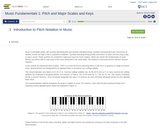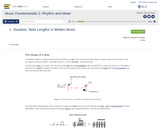
Unrestricted Use
CC BY
This collection is the first of five dealing with the rudiments of music.
- Subject:
- Arts and Humanities
- Performing Arts
- Material Type:
- Textbook
- Provider:
- Rice University
- Provider Set:
- OpenStax CNX
- Author:
- Catherine Schmidt-Jones
- Date Added:
- 12/02/2019
